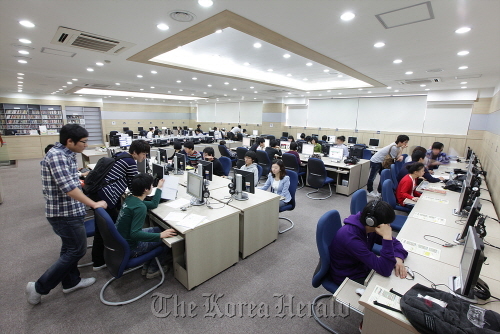Companies show upward, converging trend in customer satisfaction thanks to intense competition
Yeungjin College came first in an annual survey on consumer satisfaction conducted by the Korea Productivity Center on 274 companies and institutions last year.
Some 73,055 consumers were polled on the companies and schools across the country.
The two-year technical college in Daegu scored 88 points in the National Customer Satisfaction Index survey jointly carried out by the KPC and the University of Michigan, and sponsored by the Ministry of Knowledge Economy each year.
 |
Students work at a computer lab in Yeungjin College in Daegu. (KPC) |
The national average NCSI hit a record high 72.4 points, the highest since the survey was launched in 1998.
Yeongnam College of Science and Technology, another two-year college in Daegu, came in second with 88 NCSI points. Samsung C&T Corporation came third with 86 points.
Two-year technical colleges, apartment builders and hotels continued to rank high in the NCSI, while family restaurants, tobacco companies, tax and postal service providers fell.

 |
A bird’s eye view of Raemian-branded premium apartments bulit by Samsung C&T in Banpo, southern Seoul. (Samsung C&T) |
Five of the top 10 institutions in the survey were technical colleges including Chung Cheong University. Two were apartment builders ― Samsung C&T and Daelim Industrial (fourth place). Another two were Hotel Shilla (sixth place) and Lotte Hotel (10th place). Daegu Metropolitan Transit Corporation ranked fifth.
The construction companies offered strong customer service to minimize their dissatisfaction despite a property market slump, and the hotels satisfied their customers through renovations.
Among the 61 industries examined, apartment builders scored the highest average with 77 points, followed by hotels and airlines (both 76 points).
Thirty-five of the 61 industries saw their NCSI score rise over the previous year. The average NCSI score for subway services gained the most, with a 10.4 percent increase to 74 points.
Power supply and railway services gained 4.3 percent each.
The telecommunications sector, which showed the greatest competition with the release of products that combine wire and wireless communication devices, smartphones and tablet PCs, climbed 0.6 point from the year before.
Companies jumped into fierce marketing competition to keep existing customers or attract new ones every time a new product or service was launched.
For example, with smartphones in the mobile carrier market, the boundaries between telecom companies and smartphone manufacturers were blurred in terms of customer support, making the telecom operators play a bigger role.
“Telecom companies’ active efforts to enhance customer satisfaction, develop and support new applications, and marketing strategies based on such efforts are believed to have led the industry’s overall rise in customer satisfaction,” the KPC said in a statement.
Eleven industries, including family restaurants, tobacco companies, tax administration and the postal service, saw consumer satisfaction drop from 2010.
Average consumer satisfaction with technical colleges rose by only 1 point to 69 points, ranking 56th among the 61 categories.
Due to the intensified competition among companies to improve product quality and marketing, the overall NCSI points showed an upward but converging trend.
Several longstanding top companies were beaten by second place or third place rivals.
Asiana Airlines and Singapore Airlines, for example, had kept the top spots for years in the domestic and international air carrier categories. But last year, Korean Air received the highest marks for domestic airline, and both Korean Air and Asiana Airlines won the top place among international airliners.
As for high-speed internet services, SK Broadband advanced rapidly to join dominant firm KT in first place.
In the instant noodle category, Paldo joined Nongshim’s No. 1 spot thanks to the popularity of Kkokkomyeon, which uses white chicken broth.
Large supermarket chains, home shopping channels, life insurance, banks and technical colleges saw joint first places in consumer satisfaction.
There were 11 joint first places last year, up from seven in 2010.
The leveling trend in customer satisfaction means customers are less likely to show loyalty to certain brands, something borne out by the survey results.
Whereas 35 industries saw customer satisfaction rise, only 22 showed higher customer loyalty.
The beer industry, for instance, lost six points in customer loyalty compared to 2010 with a greater variety of beers released and tighter marketing competition.
The companies failed to approach customers with diverse marketing methods that matched the diverse products, the KPC said.
The movie theater industry, which showed no change in customer satisfaction, saw customer loyalty drop by two points as multiplexes became the norm.
The NCSI index considers the assessment of customer expectations, perceived quality, perceived value, overall satisfaction, customer complaints, consumer loyalty and retention ratio.
By Kim So-hyun (
sophie@heraldcorp.com)












